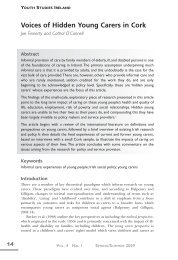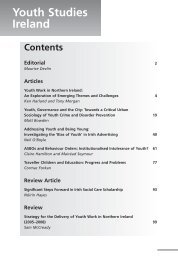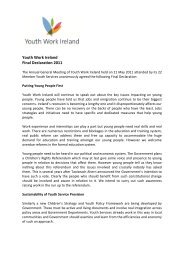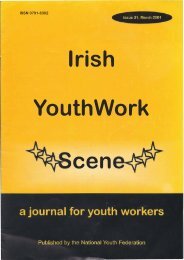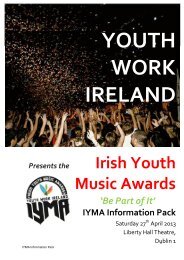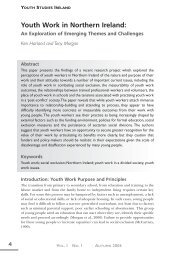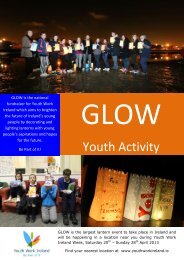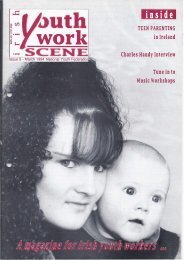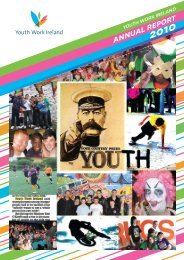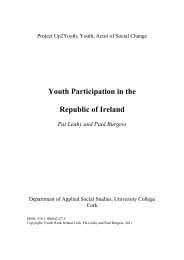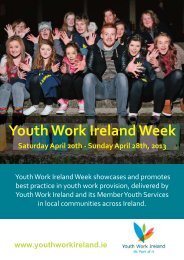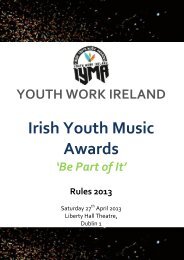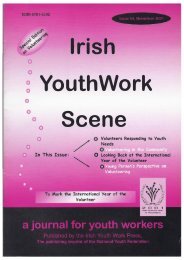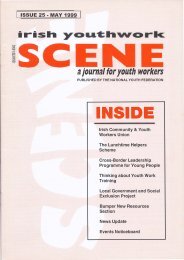YSI Jrnl Articles Vol 6 No 1 - Youth Work Ireland
YSI Jrnl Articles Vol 6 No 1 - Youth Work Ireland
YSI Jrnl Articles Vol 6 No 1 - Youth Work Ireland
Create successful ePaper yourself
Turn your PDF publications into a flip-book with our unique Google optimized e-Paper software.
YOUTH STUDIES IRELANDPast PerspectivesThe European <strong>Youth</strong> Campaignin <strong>Ireland</strong> (1950s)IntroductionThe last issue of <strong>Youth</strong> Studies <strong>Ireland</strong> included an article providing an update ondevelopments at European level relating to young people, youth work and youthpolicy. Here we look back some 60 years to a time when the idea of a European youth‘sector’ or ‘movement’ was still in its infancy. The late 19th and early 20th centuries hadseen national governments throughout Europe explicitly attempt to mobilise youth notjust in political or military terms but cultural ones too, often as a key part of the veryprocess of nation-building. It was after the Second World War that the politicisation ofyouth took on an international dimension. In <strong>No</strong>vember 1945 the World Federation ofDemocratic <strong>Youth</strong> (WFDY) was founded in London by youth movements from thestates signatory to the United Nations Charter (signed in June that year in SanFrancisco). However with the onset on the Cold War almost all Western Europeanorganisations withdrew from WFDY and it became associated with Soviet-alignedcountries. In 1948 the World Assembly of <strong>Youth</strong> was founded, which ‘clearlyestablished two sides in international youth affairs and tied them to the geopoliticalreality of the time’ (Porcaro, 2010: 29). The ‘first big wave of Europeanisation of youthorganisations’ (ibid.) arrived with the founding of the European <strong>Youth</strong> Campaign in1951. The Campaign was funded by the American Committee for a United Europe(ACUE) which had close links to the CIA and provided funding to pro-federalistgroups and parties in Europe, although often without the beneficiaries knowing wherethe money was coming from (Saunders, 2000). In <strong>Ireland</strong> the European <strong>Youth</strong>Campaign was launched in 1953 and the Irish Independent reported on the event(18th April) under the headline ‘<strong>Youth</strong> Campaign to Counteract Communism’. Thebooklet published by the European <strong>Youth</strong> Campaign in <strong>Ireland</strong> to raise publicawareness of its objectives and activities is reproduced in full below.Maurice Devlin*ReferencesPorcaro, G. ‘Geopolitics of <strong>Youth</strong> Policy in Post-War Western Europe (1945-1967)’, Coyote,<strong>No</strong>vember 2010, 28–29.Saunders, F.S. The Cultural Cold War: The CIA and the World of Arts and Letters. New York: The NewPress, 2000.52 VOL. 6 NO. 1 SPRING/SUMMER 2011
YOUTH STUDIES IRELANDpromote the ideals and principles which constitute a common heritage and toencourage economic and social progress.’The members of youth organisations were naturally even more concerned aboutthe future than those of the adult movements. They were worried by the indifference,apathy and depression of the greater part of the youth. The more enthusiastic anddiscerning wanted to have a say in determining whether Europe would freely uniteherself or, disunited, would fall a prey to a unified totalitarianism. Free youthmovements, however, suffered from lack of co-ordination and dynamism and werehandicapped by the propaganda of their Communist and non-democratic rivals. InMarch, 1952, their representatives met in Bièvres, near Paris, under the auspices of theEuropean Movement and, in spite of the difficulties and obstacles, the European <strong>Youth</strong>Campaign was born. It was NOT formed to teach youth organisations how to run theirown affairs, nor merely to hold mass meetings along Communist lines with speechesand flag-waving and spectacular posters. In addition to this superficial propaganda itswork was to be one of fundamental education.The following are, briefly, the aims and ideals of the European <strong>Youth</strong> Campaign:To break down the barriers of hate and suspicion built between nationsduring two world wars.To help national youth organisations to inform their members about thesituation and problems existing in fellow-countries of Europe.To inspire youth movements with the ideals which will preserve theirreligious, cultural and social heritage.To make young people realise that the State is a human institution whichmust be prepared to share its power with others if it becomes necessary forthe good of its citizens.To ensure that young people will take their part and assume theirresponsibilities in the future of their Continent.The Structure and <strong>Work</strong> of the European<strong>Youth</strong> CampaignIn most of the member countries of the Council of Europe (and in Switzerland, Austriaand Finland) there is a National Committee composed of representatives from all theorganisations which work with the European <strong>Youth</strong> Campaign. [See list at end.] Thismeets at intervals during the year to decide the policy and working of the Campaignon the national level. There is a National Secretary in each country who is responsiblefor organising the national work of the Campaign and who acts as a link between theNational Committee and a Central Secretariat which co-ordinates the activities of thedifferent countries.The practical work done by the Campaign in <strong>Ireland</strong> may be summarised as follows:1. To organise conferences, lectures and meetings on subjects of Irish-Europeaninterest and importance.54 VOL. 6 NO. 1 SPRING/SUMMER 2011
The European <strong>Youth</strong> Campaign in <strong>Ireland</strong> (1950s)2. To provide speakers, films or literature of an international nature for affiliatedyouth organisations and to encourage them to increase the European content oftheir programmes.3. To ensure the representation of Irish movements at youth conferences abroad.4. To help, if requested, with technical help and advice, any affiliated youthorganisation.Irish youth must play their part in helping to shape the future of Europe. To do thisthey must receive some impetus and inspiration. To do it effectively, they must have thenecessary information and background.The contributions to discussions during the various conferences held by theCampaign during the past few years show the keen interest taken in present dayproblems and have been on a very high level. Irish delegates, whether young tradeunionists, students, young farmers or members of voluntary youth organisations, havehad an opportunity of bringing their contribution to youth conferences abroad. Theamount of attention they have received and the interest shown in what they had to sayare indications of how much their contribution is welcomed. The Campaign tries toensure the continuation and improvement of that contribution. It tries to interest moreand more of the members of youth organisations in <strong>Ireland</strong> so that its activities will notbe confined to any one small group and so that it may be truly representative.Past Perspectives<strong>Ireland</strong> and the European Reality<strong>Ireland</strong> may be romantically considered ‘an island of dreams set in the grey Atlantic’,she may be a young nation struggling to overcome the economic legacy of her tragicpast, she may be a country of opportunity and promise, but she remains an integralpart of Western civilisation and of the Continent of Europe from which it sprang. Anoverpreoccupation with the affairs of her immediate neighbour may sometimesobscure this fact, but, if <strong>Ireland</strong> is considered outside Europe, her past loses itssignificance and her future its natural development.<strong>Ireland</strong> has supported almost all the major efforts towards European unity madeduring the past thirty years. When Mr Eamon De Valera spoke in the Dáil on theratification of the Council of Europe he said: ‘However, I can say for my part, and I thinkon behalf of our Party, that we support the ratification and that every step that is reasonably takento bring about the unity of the States of Europe we will support ….It is not the first time that representatives of this State have spoken in favour of Union. I wasinterested, as the representative of this State, in these ideas at Geneva, and I remember that it waslike a cold douche to read some of the replies that were sent to the memorandum that was circulatedin connection with the Briand proposal.’ (The Briand proposal was the work of M. AristideBriand, French Foreign Minister and a <strong>No</strong>bel Prize winner, and was introduced in1929 at the League of Nations. M. Briand proposed to set up a European Federation‘elastic enough to respect the independence and national sovereignty of each Statewhile guaranteeing to all the benefits of collective solidarity’. The replies of the nationswere unenthusiastic and after they had been sent to a Special Commission for study theproposal died a natural death.)55
YOUTH STUDIES IRELANDThe congress at the Hague, from which the European Movement sprang, wasattended by Dr Michael Tierney, President of University College, Dublin, SenatorEleanor Butler and the late Senator James Douglas as representatives of <strong>Ireland</strong>.The Statute of the Council of Europe was signed by Mr Sean MacBride as the IrishMinister for External Affairs and the subsequent meetings of the Assembly and Councilof Ministers in Strasbourg have been attended by Irish delegations.These activities are not surprising when one remembers that one of the complaintsof the Irish people for several hundred years was that they were cut off from the affairsof Europe and that the other countries of Europe have sent help and encouragementto their fellow nation when it was needed most.Treaties and official expressions of friendship are, however, useless unless they areinspired and implemented by the convictions and enthusiasms of the citizens of thenations which make them. They are so much waste paper unless they represent thefeelings of the people. It is in this connection that the Irish, and particularly the Irishyouth, must realise their responsibilities. We have known war and famine and miseryin the past. We have been spared the horrors and destruction of the last World War. Itis surely our welcome duty to bring help and encouragement to those who havesuffered even more than we have ever done.<strong>Ireland</strong> can offer friendship to all the countries of Europe and she can implementthat friendship with a real and lasting co-operation. The problems of the youngunemployed in Italy or the young refugees in Germany should not cease to concernthose who call themselves Christians merely because they live in a different country orspeak a different language. Social, economic and political co-operation are needed ifthe questions which affect Europe, and <strong>Ireland</strong> as a part of Europe, are to be answeredin a satisfactory way.The Tánaiste, Mr William <strong>No</strong>rton, T.D., expressed the sentiments of the Irishdelegation at the opening of the 1949 session of the Council of Europe when he said:‘… conferences and resolutions and even written agreements mean nothing unlesseach of us resolves that this Assembly shall forsake the methods of the past and planfor the future on the basis of truth and honesty – in other words, that we follow in ourdaily lives and in the relations of one country with another the simple philosophy ofdoing to others as we would wish them to do unto us. It is only on that basis thatEurope can rise from its ashes and its impoverished people can rise from their kneesto plan together and create the dawn of a new Europe...It is not from outwardpressure, it is not from the sword that deliverance comes to nations; the sword cannotbreed peace, it can only impose terms of peace. The forces, the influences, that are torenew the face of the earth, must spring from men's hearts.’These words sounded as a warning in 1949 and were not heeded. They are as validtoday and it is generally acknowledged that if they remain unheeded the consequenceswill be even more terrible than in 1939.‘The great nations of the Continent, with their long history freighted with memoriesof glory and power, may impede the construction of a European union, liable as theyare, if they are not careful, to measure themselves by the standards of their own pastrather than by those of the realities of the present and provisions for the future.56 VOL. 6 NO. 1 SPRING/SUMMER 2011
The European <strong>Youth</strong> Campaign in <strong>Ireland</strong> (1950s)United Europe cannot be built upon an abstract idea. She must depend for supporton living men. Who will they be? Hardly the former statesmen of the old Europeanpowers … . It will come from men who sincerely love peace, from men of order andtranquillity … . These are the people who will carry on their shoulders the edifice ofunited Europe.’(Extracts from the address of His Holiness, Pope Pius XII, delivered to delegates of theSecond International Congress of the European Union of Federalists in Rome, 11th<strong>No</strong>vember, 1948.)The following organisations are represented on the Irish National Committee ofthe European <strong>Youth</strong> Campaign:Boy Scouts of <strong>Ireland</strong>; Catholic Boy Scouts of <strong>Ireland</strong>; Catholic Women’sFederation of Secondary School Unions; Catholic Young Men’s Society; Comhairle leLeas Óige; Dublin Institute of Catholic Sociology; Dublin University Association forInternational Affairs; Girls’ Friendly Society; Irish Association of Catholic UniversityStudents; Irish Countrywomen’s Association; Irish Girl Guides; Irish Students’Association; Macra na Feirme; Muintir Na Tíre; Tuairim.Past PerspectivesChairman:Mr P.T. Hughes.Secretary:Miss Miriam Hederman, 71, St. Stephen's Green, Dublin.57



